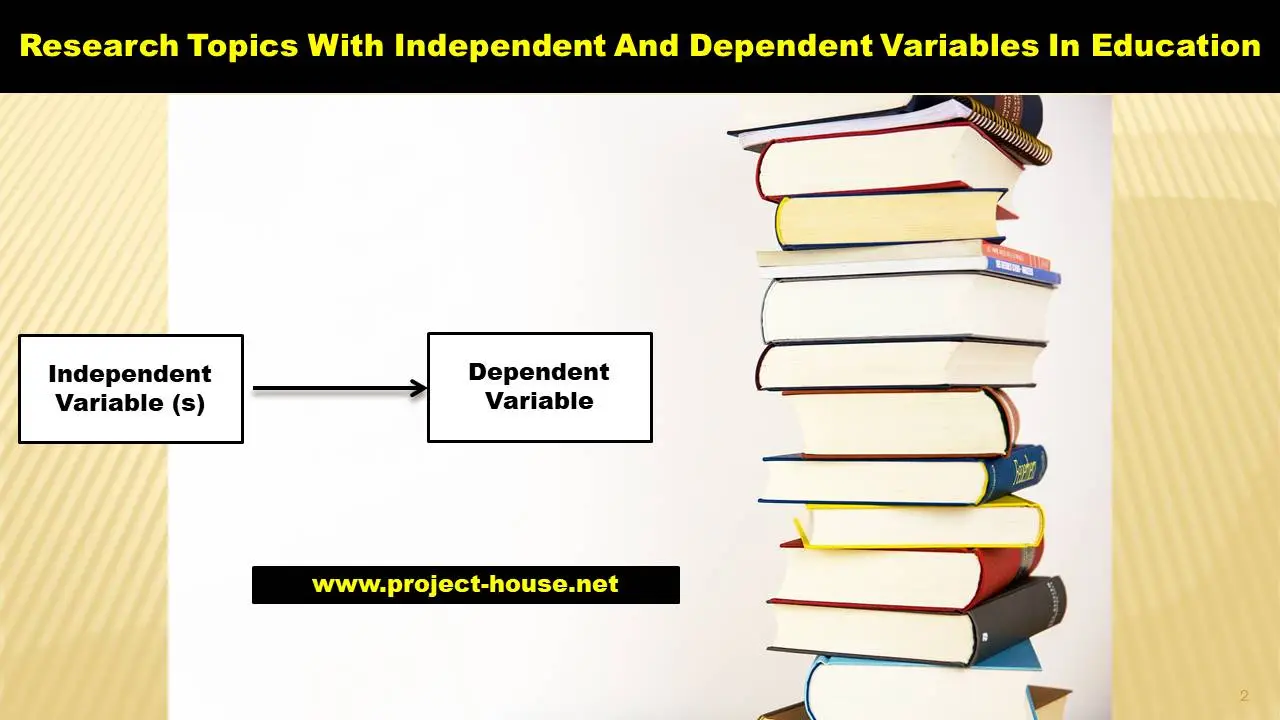How to Choose Research Topics with Independent and Dependent Variables in Education
How to Choose Research Topics with Independent and Dependent Variables in Education
When conducting research in the field of education, it’s important to understand the concepts of independent and dependent variables. These variables play a crucial role in determining the relationship between different factors and outcomes. In this article, we’ll explore some research topics in education and identify the independent and dependent variables involved.
Understanding Independent and Dependent Variables.
Independent and dependent variables are key components of any research study. The independent variable is the variable that is manipulated or changed by the researcher, while the dependent variable is the variable that is measured or observed.
By understanding these variables, researchers can better understand the impact of different factors on educational outcomes.
Identifying Independent Variables in Education Research.
In education research, the independent variable is the variable that is manipulated or changed by the researcher. For example, if a researcher wants to test the effectiveness of a new teaching method, the independent variable would be the teaching method itself.
The researcher would manipulate this variable by implementing the new teaching method in one group of students while using a different teaching method in another group of students.
By comparing the outcomes of the two groups, the researcher can determine the impact of the independent variable on the dependent variable (such as student achievement or behaviour).
Tips for Identifying Independent and Dependent Variables in Education Research.
Identifying independent and dependent variables in education research can be challenging, but some tips can help.
First, clearly define the research question and the variables involved. Then, determine which variable is being manipulated or changed (the independent variable) and which variable is being measured or observed (the dependent variable).
It can also be helpful to consider the context and potential confounding variables that may impact the results. Finally, make sure to clearly label and define the variables in the research design and analysis to ensure an accurate interpretation of the results.
10 Examples of Independent and Dependent Variables in Education Research.
In education research, the independent variable can take many forms. For example, it could be a specific teaching method, a particular curriculum, or even the use of technology in the classroom.
The dependent variable, on the other hand, is the variable that is being measured or observed in response to the independent variable. This could be student achievement, behaviour, or attitudes.
For example, if a researcher wants to test the impact of a new teaching method on student achievement, the independent variable would be the teaching method, while the dependent variable would be student achievement scores.
By measuring the difference in achievement scores between the group that received the new teaching method and the group that did not, the researcher can determine the impact of the independent variable on the dependent variable.
1). The Effect of Technology Integration on Student Achievement (Independent Variable: Technology Integration, Dependent Variable: Student Achievement)
This research topic explores the impact of technology integration on student achievement. The independent variable is technology integration, which can be measured by the level of technology used in the classroom, such as the use of computers, tablets, or interactive whiteboards.
The dependent variable is student achievement, which can be measured by grades, test scores, or other academic indicators. This study can provide insights into the effectiveness of technology in improving student learning outcomes.
2). The Impact of Parental Involvement on Student Motivation (Independent Variable: Parental Involvement, Dependent Variable: Student Motivation)
This research topic examines the relationship between parental involvement and student motivation. The independent variable is parental involvement, which can be measured by the frequency and type of parental involvement in a student’s academic life, such as attending parent-teacher conferences, helping with homework, or volunteering at school.
The dependent variable is student motivation, which can be measured by factors such as engagement in class, participation in extracurricular activities, or academic performance. This study can provide insights into the importance of parental involvement in promoting student motivation and academic success.
3). The Relationship between Teacher Experience and Student Engagement (Independent Variable: Teacher Experience, Dependent Variable: Student Engagement)
This research topic explores the impact of teacher experience on student engagement in the classroom. The independent variable is teacher experience, which can be measured by the number of years a teacher has been teaching, their level of education, or their professional development.
The dependent variable is student engagement, which can be measured by factors such as participation in class discussions, completion of assignments, or attendance. This study can provide insights into the importance of teacher experience in promoting student engagement and academic success.
4). The Effect of Classroom Environment on Student Learning (Independent Variable: Classroom Environment, Dependent Variable: Student Learning)
This research topic focuses on the impact of the classroom environment on student learning. The independent variable is the classroom environment, which can be measured by factors such as lighting, temperature, seating arrangement, and noise level.
The dependent variable is student learning, which can be measured by factors such as test scores, grades, and retention of information. This study can provide insights into the importance of creating a conducive learning environment for students to maximize their academic potential.
5). The Influence of Teacher Feedback on Student Performance (Independent Variable: Teacher Feedback, Dependent Variable: Student Performance)
This research topic explores the impact of teacher feedback on student performance. The independent variable is teacher feedback, which can be measured by factors such as frequency, quality, and type of feedback given to students.
The dependent variable is student performance, which can be measured by factors such as test scores, grades, and overall academic achievement. This study can provide insights into the importance of effective feedback in improving student learning outcomes.
6). The Effects Of Positive Discipline On The Teaching-Learning Process
This research topic investigates the effects of positive discipline on the teaching-learning process. The independent variable is positive discipline, which can be measured by the different types of discipline such as preventive discipline, supportive discipline, and corrective discipline.
The dependent variable is a teaching-learning process, which can be measured by learning needs, teaching-learning strategies employ and learning, course work etc. This study can provide insights into the importance of using positive discipline in improving the student teaching-learning process.
7). School Environment As A Determinant Of Students’ Academic Performance
This research topic investigates the effects of the school environment on student academic performance. The independent variable is the school environment, which can be measured by school infrastructure, social atmosphere and psychological atmosphere.
The dependent variable is academic performance, which can be measured by the grades scores of students, test scores etc. This study can provide insights into the importance of the school environment in improving the academic performance of learners.
8). The Effect Of School Administrators’ Leadership Styles On The Enhancement Of Prosocial Behavior
This research topic investigates the effects of School Administrators’ Leadership Styles on the Enhancement Of Prosocial Behavior. The independent variable is Administrators’ Leadership Styles, which can be measured by transformational leadership style, instructional leadership style and participative leadership style.
The dependent variable is the Enhancement Of Prosocial Behavior which can be measured by student responsibility, companion, and corporation behaviour etc. This study can provide insights into the importance of administrator leadership styles employs in improving the prosocial behaviour of students.
9). The Extent To Which The Use Of ICTs In Teaching Influences Students’ Academic Achievement
This research topic investigates the use of ICTs in teaching and their influence on student academic achievement. The independent variable is the Use of ICTs in teaching which can be measured by the use of the internet, cellphone, TV, and computers.
The dependent variable is the academic achievement of learners which can be measured by class participation, GPA, test score, etc. This study can provide insights into the importance of the different ICTs tools used in teaching can improve the academic achievement of learners.
10). Investigate The Influence Of Academic Library Services On Students’ Performance
This research topic investigates the influence of library services on student academic Performance. The independent variable is library services which can be measured by cataloging services, circulation services, and acquisition services.
The dependent variable is the academic performance of learners which can be measured by, GPA, test scores, etc. This study can provide insights into the importance of the different library services that can improve the academic achievement of learners.
How to analyze and interpret the relationship between independent and dependent variables.
Once you have identified your independent and dependent variables, it’s important to analyze and interpret the relationship between them. This can be done through statistical analysis, such as regression analysis, correlation analysis etc, which allows you to determine the strength and direction of the relationship between the variables.
For example, if you are studying the effect of classroom management on student achievement, you can use regression analysis to determine if there is a significant relationship between the two variables. It’s important to remember that correlation does not equal causation, so it’s important to consider other factors that may be influencing the relationship between the variables.
We Provide Guidance and Support In The Following
- Topic Selection
- Proposal Writing
- Content Writing
- Data Collection
- Data Analysis
- PowerPoint Services
- Editing and Proofreading Services
- Plagiarism Checking And Removal
Get to Us Now: Click On The WhatsApp Icon At The Bottom Left







Leave a Reply